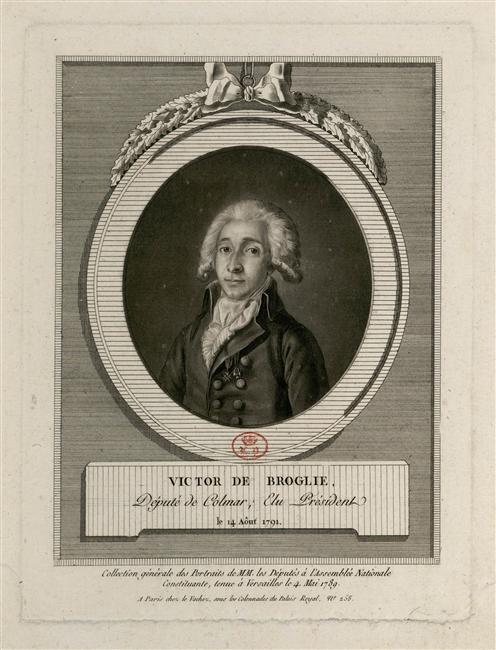Charles Louis Victor de Broglie was born on 22 September 1756 as the son of the Victor-Francois, Duc de Broglie and Louise Crozat. His father had had a successful career in the military where he had distinguished himself in the Seven Years' War. Charles was to follow in his father's footsteps.
On his father's orders he is enrolled in the infantry regiment of Limousin. Here, he quickly rose through the ranks. Charles started out as sous-lieutenant then became captain and so on; before his 25th birthday he had already been made colonel of a regiment from Aunis. On 3 February 1776 he was married off to Sophie de Rosen-Kleinropp - her father was a cavalry officer and Marquis de Trainel.
In 1781 his first child would be born; it was a girl who was named Amélie. The next year brought another daughter and another in 1784. In 1785 his wife gave birth to the couple's only son: Achille Léon.
 |
| Charles Louis Victor |
Shortly after the king had need of the Prince de Broglie's military talents again. This time he was sent across the pond to fight in the American war of independence. He would return to France in 1788 where he was awarded with new titles including colonel of the Bourbannais regiment.
By then the revolution was near by. Charles was sympathetic to the cause of the Third Estate - the people. He was chosen as deputy of the nobility to the States-General. In this function he would predominantly vote for the Left. This was the case in 1789 when he voted in favour of granting all citizens the opportunity of serving in the law or the military.
His revolutionary career went further when he was made Secretary of the Assembly in 1790. However, trouble was brewing and in these dangerous times few people could be safe. When he dissolved the Legion of Aspe riots broke out in Toulouse.
His father had emigrated and was charged by the revolutionary tribunals with conspiracy with the enemy. Charles tried his hardest to fight his father's case but received little encouragement from the father himself.
He reached the peak of his political career when he was elected President of the Constituent Assembly in 1791. However, his sympathy with the people did not mean that he simply accepted every new turn against the monarchy. His presidency lasted only four months until he resigned. Instead, he requested to be sent back to the front where his talents were more pronounced.
Being decorated with the rank of Field Marshal he was sent to the Rhine to serve under Luckner. However, at home things were heating up. Charles had never intended for the revolution to cost the life of the monarch but Louis XVI was in serious danger. Upon learning that the king had been criminally charged Charles immediately resigned his post. He returned to France where he took up residence in Bourbonne-les-Bains.
From here he kept up a correspondence with the President of the Legislative Assembly. From his letters it is clear that Charles still supported the ideals behind the revolution but had doubts as to its means. These doubts would prove fatal to the decorated war hero.
 |
| As President |
Shortly afterwards, Charles was arrested and place in the prison of Langres. This spell in prison lasted only a short while before he was released again. Despite the growing danger he opted to remain in France. The king and queen had been executed that same year. This decision would eventually lead the way to another arrest. This time there was no mercy for the formerly esteemed friend of the people. On 26 June 1794 the Prince de Broglie was placed before the Revolutionary Tribunal; he was sentenced to death.
From his prison cell he wrote to his wife and asked her not to confuse the revolution with the "many monsters she has produced". This last letter of his gives a perfect insight into his political thoughts and allegiances:
Without despising or disdaining the Ancien Regime, any attempt to reestablish it seems to me childish. I belong to the new society with heart and conviction and I sincerely believed in its infinite progress. While detesting the revolutionary state, the disorders it entails and the crimes which defile it, I regarded the French Revolution as an inevitable and salutary crisis.
Charles Louis Victor de Broglie was executed by guillotine the following day: 27th July 1794.

Excelente, esta informacion es util para mi investigacion de oficiales franceses en Venezuela en 1783. El principe Carlos luis Victor, hizo una descripcion de la ciudad de Maracay, objeto de mi investigacion. Mayor informacion en mi blogs http://historiasdemaracay.blogspot.com
ReplyDelete